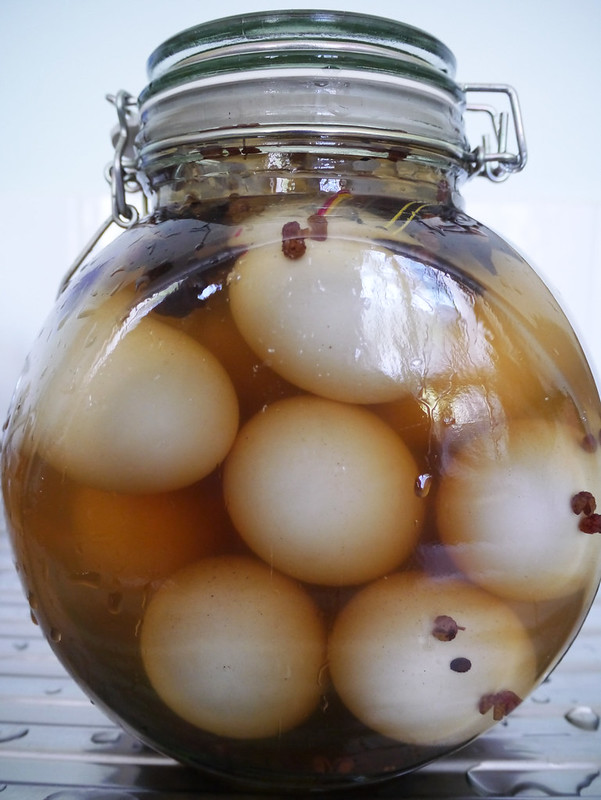
Cooked salted duck eggs are delicious as an accompaniment to “khao tom” (rice porridge/congee), or served as a salad/side dish with fresh sliced/diced tomatoes or Spanish/spring onions, or cooked with pasta, or used to make Chinese mooncakes or glutinous rice puddings.
[dropcap]One[/dropcap] of my favourite comfort foods is “khao tom”, aka congee/rice porridge. It is a simple dish (recipe on its way – hold your horses, tiger!), but you can add to the base recipe as you please, making it a perfect choice for a nourishing home meal and get well remedy.
The deliciously soft and starchy aromatic rice brew is essentially jasmine rice cooked in a lot of water until it is a wet porridge-like consistency. It is often eaten for breakfast or as a light meal, hot, and flavoured with a sprinkling of salt/pepper, soy sauce, chili oil, finely chopped spring onions and coriander, perhaps some pork floss, tears of meat (usually poultry), and/or a sweet/savoury vegetable/meat stirfry – my favourite is “khua puck bong” (stirfry Ipomoea aquatica). Yum-o!
Another great side dish to have with a bowl of khao tom is sliced/diced “khai ped kem”, aka salted duck eggs. 1 Salted duck eggs (the ones I’m referring to at least) is of Chinese origin, and not your typical Lao dish, although it is eaten by Lao people (g’day!). This is the first non-Lao recipe presented in this blog, and I hope it exemplifies the diversity of food that I enjoy eating and would like to share with you, not always traditional Lao food.
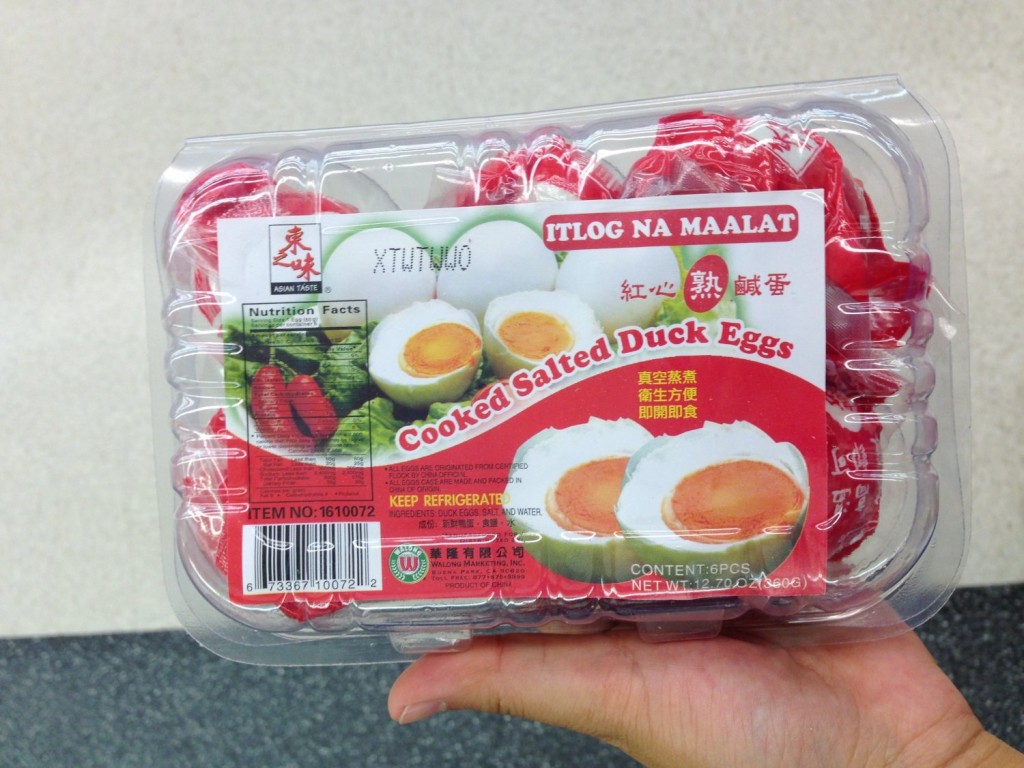
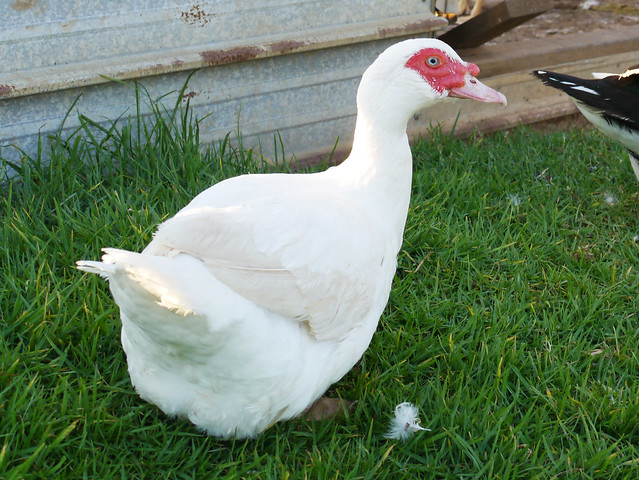
The recipe calls for fresh duck eggs, however, chicken eggs will do the job just fine. This is a Muscovy duck from the farm where I collected the eggs from. I’m not sure if it’s a male or female but it certainly looks content to have its photo taken!
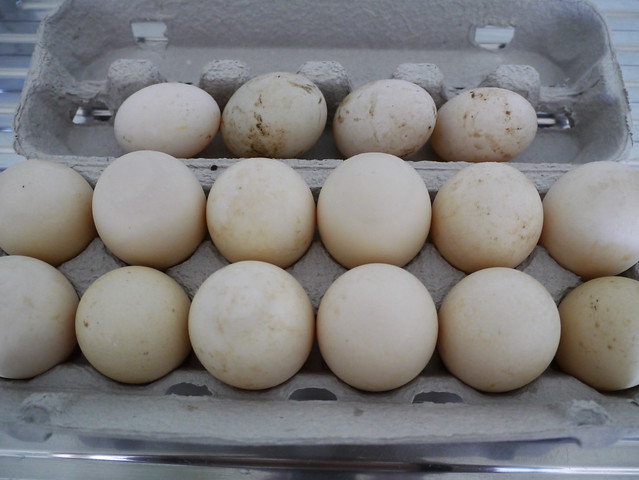
You can sometimes find fresh duck eggs at your local farmers market or Asian grocer/butcher. I obtained the above duck eggs from a local farmer, who had so many duck eggs that she offered a dozen of Muscovy duck eggs and 4 Call duck eggs (top row) to me for free. I’m so grateful for her generousity and happy to know that such kindness exists in our world. Thanks Shayne!
“Kai ped kem” is readily available at many good Asian grocers (along with its close relative – century duck eggs). However, after having made padaek recently, I’ve been a little pickle/preserve obsessed, and I simply had to try and make these saline delights myself. Besides, food just tastes better when it’s homemade (with love), and it’s so much fun to do too. Also, there are no nasty preservatives added (except for the copious amount of salt in this recipe), and you know exactly what’s put in it. 2
Preserving eggs in brine is an old recipe, and as per usual there are different ways to do it. In its simplest form, the recipe for salted duck eggs are: duck eggs, salt and water. The addition of spices and Shaoxing rice wine in the following recipe help elevate the appearance and flavour of the cooked duck eggs, giving them an intense yet delicate taste more superior to basic salted eggs.
The Shaoxing rice wine in particular, transforms the egg yolk into an oily rich orange/red globe full of creamy egg goodiness. I have adapted the following recipe from Christine’s Recipes, where you’ll find more delicious and inspiring Asian/Western recipes. Thanks Christine!
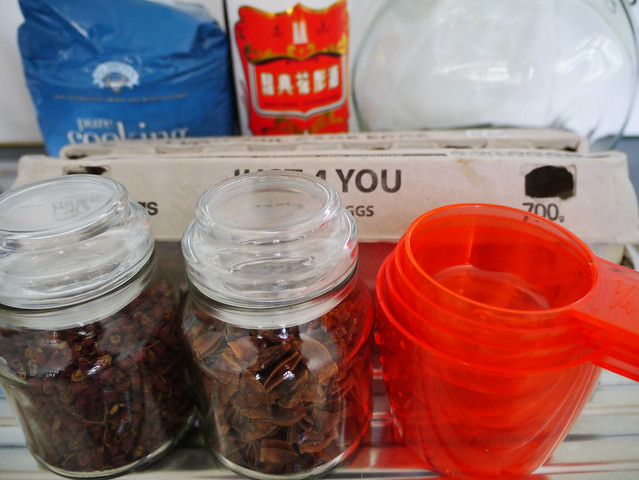
Ingredients you’ll need to make salted duck eggs include one dozen of fresh duck eggs (or chicken eggs), sea salt (or rock salt), Shaoxing rice wine, star anise, Sichuan peppercorns, and water. You will also need a large glass jar to preserve the eggs in.
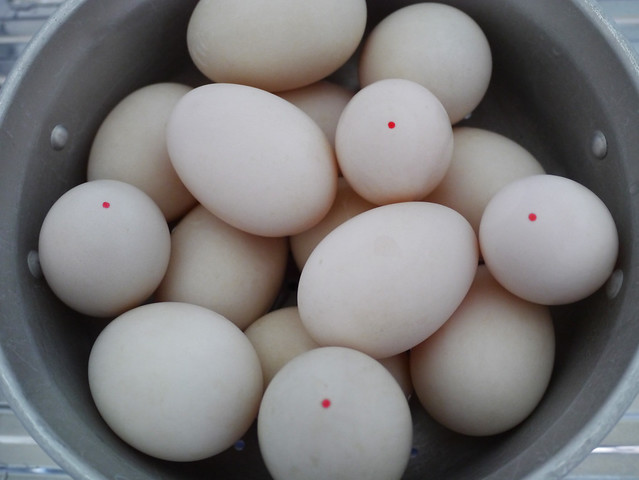
Gently wash and clean the duck eggs. The four Call duck eggs are marked with red dots for id and later comparison in taste.
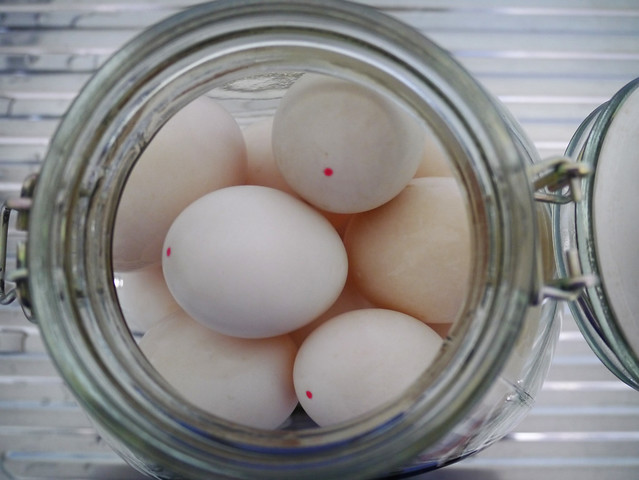
Carefully place the washed eggs into a large glass jar. I had to omit one Call duck egg from the jar because the lid could not close properly.
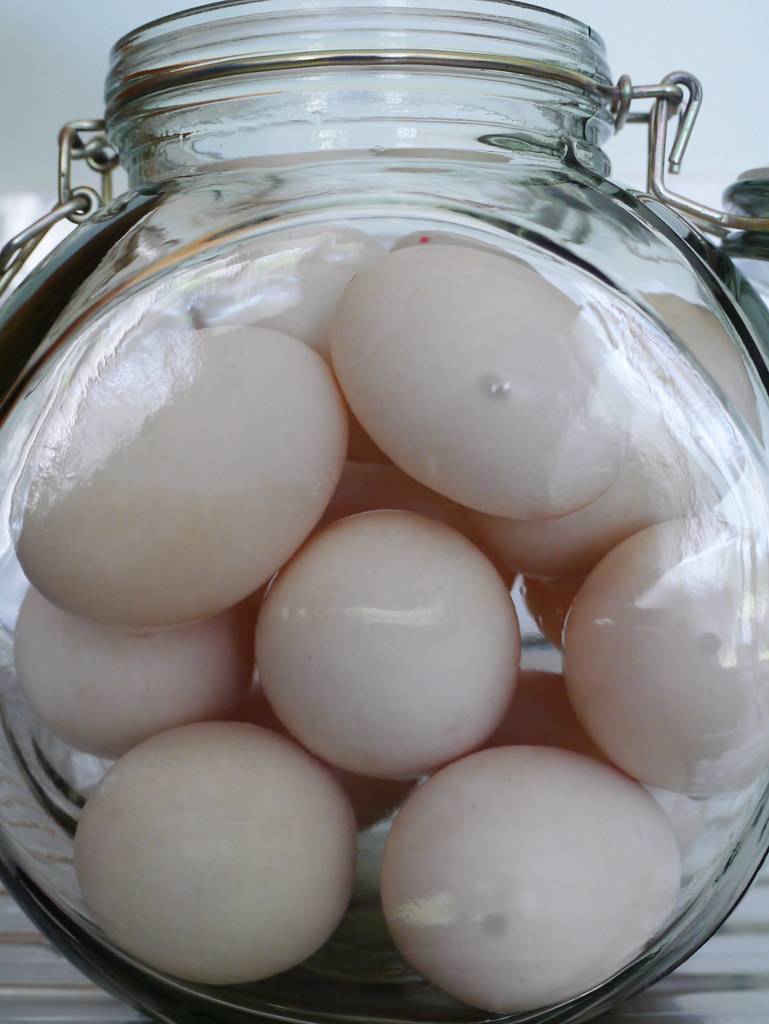
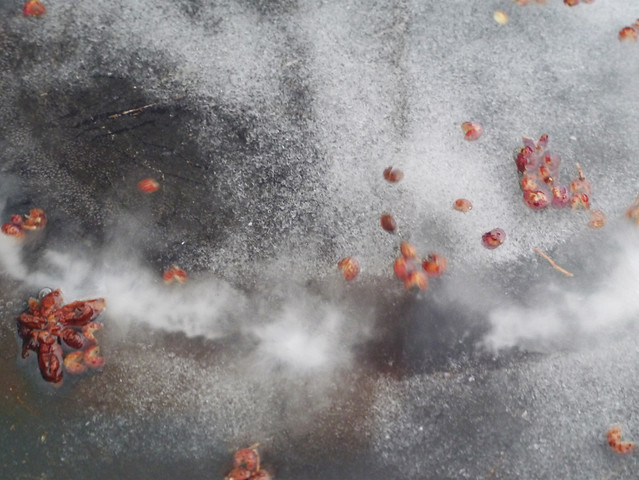
To make the brine solution – in a saucepan, add the water, sea salt, star anise (I used 4 whole star anise because I don’t like to follow recipes completely, and I love the smell of star anise so much that I can’t possibly imagine any harm it can do – we’ll see), and Sichuan peppercorns – bring to the boil. Once the salt is completely dissolved, turn off the heat and let the solution cool down. Once the solution is completely cooled, add the Shaoxing wine and stir well.
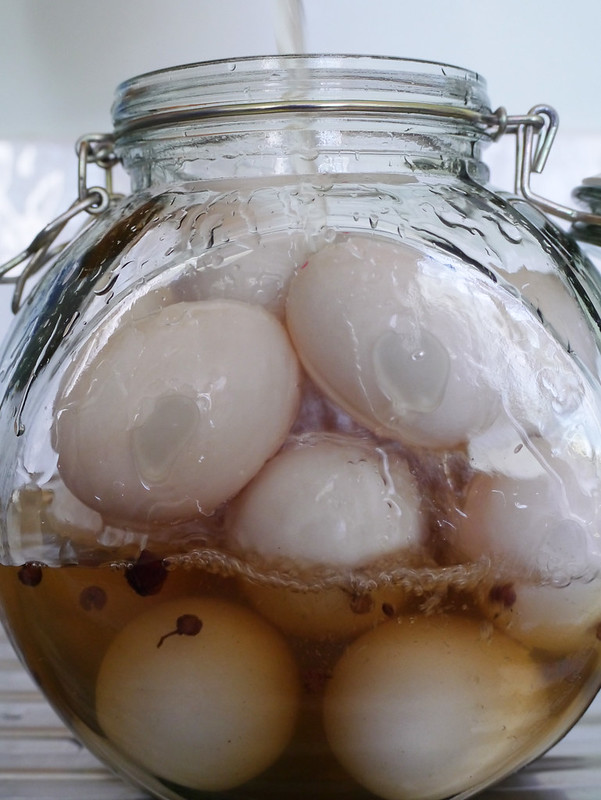
Pour the cool brine solution into the glass jar to completely cover all of the eggs.
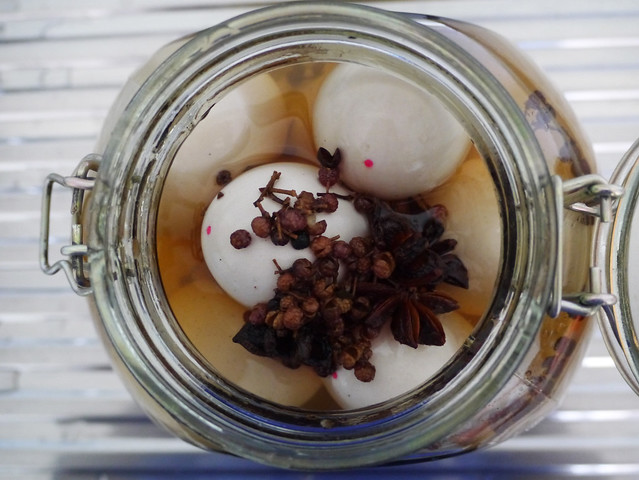
Unfortunately, because I used 3 extra eggs and my glass jar is oddly shaped, I did not have enough brine to fully cover all of the eggs. However, if you use exactly a dozen of eggs and a normal cylindrical glass jar, there should be adequate brine. I had to make another half round of brine to complete the job.
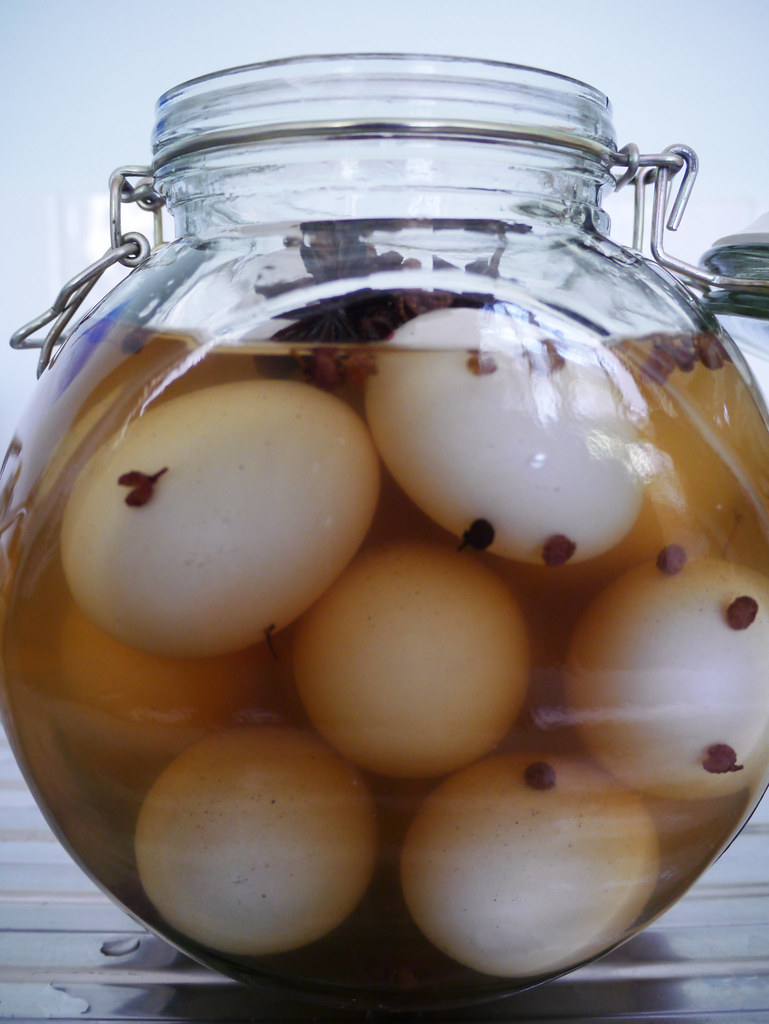
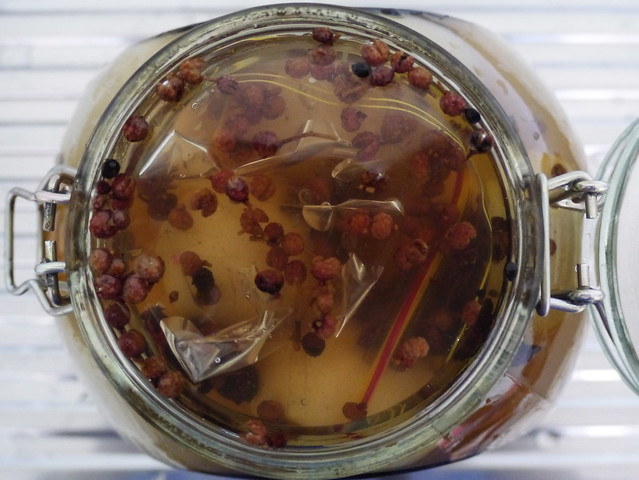
Because of the high salt content in the brine, the eggs at the top will float to the surface. To prevent this, place a small zip-lock sandwich bag filled with some water into the jar, on top of the eggs, to help keep the eggs fully submerged. Place the lid back on the jar and clip-lock/seal. And there you go! A jar of preserved salted duck eggs, aka “khai ped kem”. A bit of intermission but we got there in the end. A little celebratory dance is permitted!
- 12 fresh duck eggs (or chicken eggs)
- 1 cup of sea salt (or rock salt)
- 2 star anise
- 2 tsp of Sichuan peppercorns
- 1 Tbsp of Shaoxing rice wine
- 4 cups of water
- First, gently wash and clean the duck eggs and dry them.
- Carefully place the washed eggs into a large glass jar.
- To make the brine solution - in a saucepan, add 4 cups of water, 1 cup of sea salt, star anise (I actually used 4), and 2 teaspoons of Sichuan peppercorns - bring the mixture to the boil. Once the salt is completely dissolved, turn off the heat and allow the brine solution to cool down. Once the solution is completely cooled, add one generous Tablespoon of Shaoxing wine and stir well.
- Gently pour the cool brine solution into the glass jar to completely cover all of the eggs.
- Because of the high salt content in the brine, the eggs at the top will float to the surface. To prevent this, place a small zip-lock sandwich bag filled with some water into the jar, on top of the eggs, to help keep the eggs fully submerged.
- Place the lid back on the jar and clip-lock/seal.
- Store the jar in a cool kitchen cupboard for about 30-40 days.
- After 30 days, remove one egg to cook and taste to see if it is salty enough. Cook the egg(s) by boiling them in water for about 20 minutes. If you’re happy with the intensity/flavour of the eggs, drain them and wipe dry. They can be stored in an egg carton in the fridge for a few weeks, ready for your next khao tom/congee.
Sichuan is also spelt Szechwan and Szechuan.
Shaoxing is also spelt Shaohsing.
What you’ll need:

In retrospect:
I am a little concerned with the dark colour of the brine solution compared to Christine’s example. I believe that the colour of the brine is derived from the spices and the generous amount of Shaoxing wine that I added to it. Hopefully, the colour of the brine will not affect the colour of the egg white too much when the eggs are cooked. I’ll let you know in 30 days time.
Did you know?
- Shaoxing rice wine is made from fermented brown glutinous rice and is considered second only to soy sauce in importance, in Chinese cuisine. It contains about 17-18% alcohol, and can be drunk as a beverage. 3
- Duck eggs are considered superior to chicken eggs with the same taste and richer/smoother consistency. Duck eggs have twice the nutritional value of chicken eggs and stay fresher longer due to their thicker shell. Duck eggs are richer with more “albumen” (egg white), making cakes and pastries fluffier and richer. Duck eggs also have more omega 3 fatty acids (something you can actually see in the cooked salted duck eggs). Omega 3 is thought to improve everything from brain health to healthy skin. 4
- Muscovy ducks are less noisy than usual domestic ducks, and sometimes marketed as a “quackless” duck. They aren’t completely silent, but they don’t actually quack (except in cases of extreme stress!). 5
- Adding baking soda in the water when hard-boiling eggs can help make a fresh egg easier to peel. 6
Update 17/02/14:
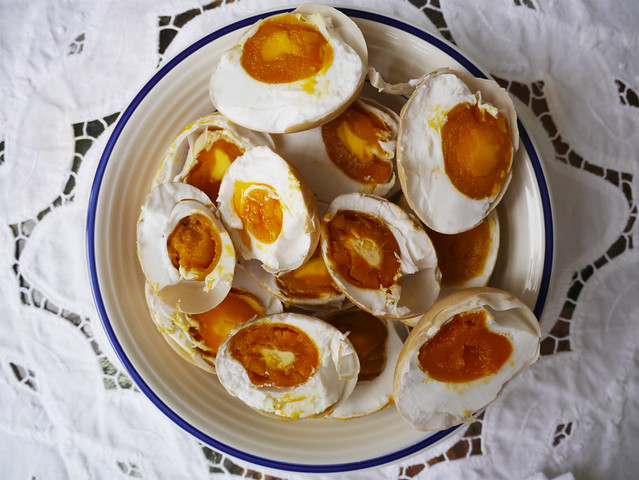
The salted duck eggs were a success! Read the full story here.
Notes:
- Not to be confused with “tom kem”, which is a flavoursome traditional Lao sweet/savoury meat (usually pork hocks/trotters) stew with boiled eggs. ↩
- On the cards for future pickling endeavours, include pickled onions, pickled gherkins, Lao pickled cabbage (“som puck garlum-be”), pickled Thai eggplants (“dorng mark khua”), and pickled plums (“dorng mark plum”) too. ↩
- Reference: http://en.wikipedia.org, http://www.vietworldkitchen.com. ↩
- Reference: http://www.localharvest.org. ↩
- Reference: http://en.wikipedia.org. ↩
- Reference: http://www.finecooking.com. ↩
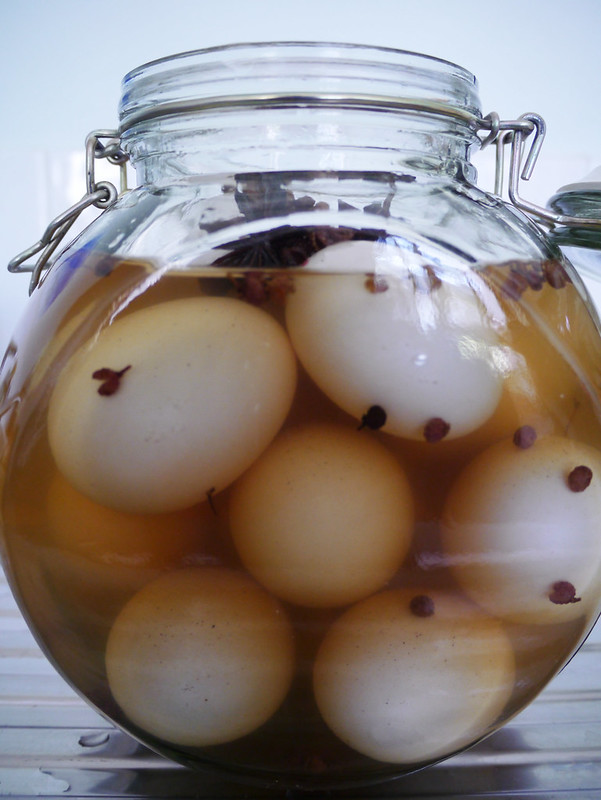
I will have to give this a try, do you think chicken or quail eggs would work also? I like how you do your recipe, I see a cook book material right here. :)
Hi Nye, Thanks for your comment. Salted duck eggs are easy to make and taste delicious! You should definitely give them a try. Chicken eggs will work just fine, likewise with quail eggs. I think most poultry eggs should preserve well, you’ll just have to monitor how long you pickle them for so they’re not inedibly too salty. I recently found a recipe online where quail eggs are pickled in beetroot brine which give the eggs a purple/pink colour. Although, the quail eggs are hard boiled and peeled first before pickling. Thanks for your kind comment about the site. I really appreciate it!
Lovely to see a flickr friend visit my blog – thanks Padaek :)
I’ve seen recipes for preserved eggs and I’m pretty sure I’d enjoy these as I love Sichuan peppercorns and rice wine, such lovely flavours. That second last photo of the eggs is so beautiful (and the duck is super cute :D)
Cheers x
Hi Emma, you’re welcome, likewise! Flickr is such a great tool. It’s strange not many bloggers are using it to their advantage. The flavours of the cooked eggs are intense; salty egg white and creamy egg yolk. Every so often, they’re a great treat to have. Yeah, the duck is cute, definitely knows where the camera is.
I’ve never preserved eggs before. I’ve eaten them but it all seems like such a lot of work. After reading this I’m on the hunt for duck eggs!
Hi Maureen, Making salted duck eggs can be a delicate process but quite a breeze, especially for an experienced chef like yourself. The prize is the rich oily egg yolk when they’re cooked. They can be eaten as a tasty side dish or used in recipes. I enjoyed making them. Thanks for your visit and comment!
This looks so interesting. I just made a Cambodian pork rice soup for my blog, using Jasmine rice, that sounds a lot like the wholesome porridge you mention. I bet these eggs would be a great accompaniment!
Hi Lisa, Thank you for stopping by and leaving your comment. I just had a look at your site and the recipe you mentioned, and both look wonderful. The salted duck eggs are quite versatile, and can be served/cooked in numerous ways. Sliced/diced, they would taste great with your delicous rice soup. Have a great day!
I have successfully made this on my first try, a few years back… I am doing it again this time.. It has been 2 weeks… However, the water becomes murky so easily in about 3 days’ time and it smells, so I have changed the salt water once, since.. I am not sure what is wrong.. Is it because this time I do not cook the water with the sea salt? I dissolved the sea salt into the water on room temperature.. Or because I do not fully covered the container? I left a bit of air opening.. Please give me your advice.. I am draining the water now, as I am writing this.. For the 2nd change of solution, because it becomes murky and smelly again… Looking forward to your prompt reply soon (preferably straight to my e-mail add), as I do not know what to do with the eggs now.. Thank you..